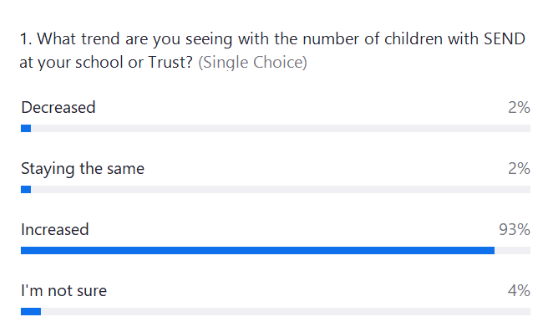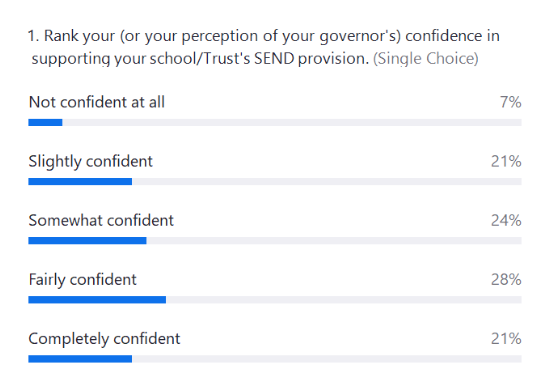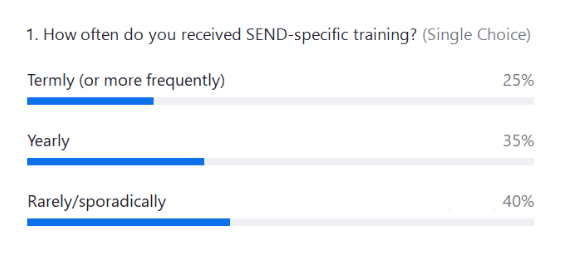SEND 101 for Governors/Trustees: Supporting your School Community
_1000.png)
This blog is based on Judicium’s SEND Service ‘Sofa Session’ from the 16th May, with our resident expert Rik Chilvers. This session focused on the essentials of what governors/trustees need to know about SEND, an overview of how governors/trustees should be fulfilling their strategic role in relation to SEND, and how governors/trustees can support schools with their SEND provision.
Poll 1

Poll 2

The essentials of what governors/trustees need to know about SEND
Needs
When talking about SEND, it's helpful to ground ourselves in the specifics of the challenges children in schools may face. Here’s a review of the four broad areas of need:
- Sensory and/or physical
Includes needs such as visual/hearing impairments and physical disabilities.
- Communication and interaction
Encompasses needs such as speech, language and communication needs and autism.
- Cognition and learning
Includes needs such as global developmental delay, moderate learning difficulties and specific learning difficulties (e.g., developmental coordination disorder, dyslexia).
- Social, emotional and mental health
Legislation and guidance
A quick review of the legislation that underpins SEND provision.You should be familiar with:
- The Children and Families Act
- Part 3 - children and young people with SEND
- The Equality Act
- Part 2, chapter 1 - protected characteristics
- Part 6, chapter 1 - schools
- The SEND Code of Practice
- Chapter 1 (Principles)
- Section 19 of the Children and Families Act 2014 sets out the principles underpinning the legislation and the guidance in this Code of Practice. This chapter sets out those principles and how they are reflected in the chapters which follow.
- Chapter 2 (Impartial information, advice and support)
- This chapter is about the information, advice and support, which local authorities must provide for children, young people and parents, covering special educational needs (SEN), disability, health and social care.
- Chapter 5, 6 or 7 depending on type of your setting.
- Chapter 1 (Principles)
If you haven't read these or it's been a while since you have, it’s a good idea to familiarise yourself with these pieces of legislation. There are many more whichset out how governors fulfil their duty, but these are the SEND-specific ones.
Acting on the guidance
Reading through those documents, a few key tick-box tasks will jump out:- Do you have a SEND Policy and Information Report on your website that has been ratified by your governing body in the past year?
- Have you checked the Information Report contains all it must? (There are no requirements for the contents of the policy).
These two tasks are a great starting point for engaging with SEND in your school. The policy should set out your aims and principles for supporting children with SEND. The information report details the implementation of this, i.e., it reflects practice.
It's also worth considering whether you are making reasonable adjustments for children with SEND, under the Equality Act.
All schools have duties under the Equality Act 2010 towards individual disabled children and young people. They must make reasonable adjustments, including the provision of auxiliary aids and services for disabled children, to prevent them being put at a substantial disadvantage. These duties are anticipatory – they require thought to be given in advance to what disabled children and young people might require and what adjustments might need to be made to prevent that disadvantage. Schools also have wider duties to prevent discrimination, to promote equality of opportunity and to foster good relations.
- Is your site accessible? If not, do you have a plan in place for how to make it accessible?
- Are appropriate safeguarding measures put in place for children with SEND?
- Are exam access arrangements in place for all years?
- Are your admissions procedures non-discriminatory to children with SEND?
- Are children with SEND able to access clubs and trips?
- Behaviour policy allows children with SEMH (e.g., ADHD) to thrive
- Do all parents/carers of children with SEND know they have SEND and are receiving support?
These questions and engaging with your policies will give you some ideas of where you might want to start when reviewing your SEND provision.
Specifics
SEND should be something all governors are familiar and confident with. However, at Judicium we know from audits of schools what often happens is, in line with 6.3 of the SEND Code of Practice, there is a single member of the governing body, or possibly a sub-committee, who have specific oversight of the school’s arrangements for SEN and disability.
Poll 3

The Code of Practice, in paragraph 6.90, sets out the expectation this governor or sub-committee should be meeting regularly with the SENDCO "to ensure that the school meets its responsibilities under the Equality Act (2010) with regard to reasonable adjustments and access arrangements."
How governors can support schools with their SEND provision
Governors need to be mindful that their role is not an operational one. Instead, they should be working strategically.
Advocating for the SENDCO
A key contribution governors can make is to advocate for the SENDCO. A Judicium survey conducted in November 2023 revealed two-fifths of SENDCOs are not on the senior leadership team. If this is the case at your school, or even if not, it's vital governors are actively championing the work of the SENDCO and their team and considering ways the priorities of the SENDCO can be integrated into other areas of the school's development.
Data
Advocating for the SENDCO requires a good understanding of what they're working on and why. A solid understanding of this is going to come through engaging with the school's data. When SENDCOs meet with their link governor, it is important they understand:- the proportions of particular needs within the school.
- any trends the SENDCO has identified.
- the progress and attainment of children with SEND.
- the attendance of children with SEND.
- what the behaviour of children with SEND was like.
Sharing this information enables the link governor to provide effective strategic challenge.
Together you can consider:- the training staff require and funding for it.
- how TAs are deployed.
- interventions the school should offer.
A solid understanding of this data also enables governors to scrutinise their school's budgetary decisions. Indeed, the Code of Practice details this in paragraph 6.97:
It is for schools, as part of their normal budget planning, to determine their approach to using their resources to support the progress of pupils with SEN. The SENCO, headteacher and governing body or proprietor should establish a clear picture of the resources that are available to the school. They should consider their strategic approach to meeting SEN in the context of the total resources available, including any resources targeted at particular groups, such as the pupil premium.
Community engagement
All this strategic support needs to be grounded in the community the school serves. With that in mind, we recommend governors engage with parents/carers as much as possible. This means attending some parents' evenings or events such as coffee mornings with the goal of hearing directly from parents their view of the school's provision for children with SEND.
For the same reason, governors should also try to separately meet staff and students, both 1:1 and in groups.
Operational Strategic
There are some specific issues that, at first glance, appear more operational than strategic.
EHCPs
Children whose needs require additional, specific provision may have an Education, Health and Care Plan (EHCP). The Code of Practice sets out that:
9.129: As well as the child’s parent or the young person, the final EHC plan must also be issued to the governing body, proprietor or principal of any school, college or other institution named in the EHC plan...
and that
9.80: The local authority must consult the governing body, principal or proprietor of the school or college concerned and consider their comments very carefully before deciding whether to name it in the child or young person’s EHC plan, sending the school or college a copy of the draft plan. If another local authority maintains the school, they too must be consulted.
Governors don't need to read every EHCP in detail but, to better understand the needs the school must provide for and the strategic work necessary to assure this, they may consider reading:- A - the views, interests and aspirations of the child and their parents
- B - the child's SEND
- E - the outcomes being sought for the child
- F - the special educational provision required for the child
PDCs
The most 'hands on' governors are likely to get in relation to SEND at their school is when considering a headteacher's decision to suspend or permanently exclude a child. The guidance states:
Governing boards have a key responsibility in considering whether excluded pupils should be reinstated. This forms part of their wider role to hold executive leaders to account for the lawful use of exclusion, in line with the duties set out in law, including equalities duties.
Suspension_and_permanent_exclusion_guidance_september_23, page 35
What this means is governors will convene in a meeting - often called a pupil disciplinary committee (PDC) - to consider whether to reinstate the pupil. This decision should consider the interests and circumstances of the pupil, their peers, staff and the school community.
Clearly, governors will want to know the school has met any SEND the pupil may have before deciding to suspend or exclude them. Governors should therefore:- request evidence of this provision.
- review written representation from the pupil or their parents/carers.
- invite the pupil's social worker, if they have one, and if the pupil is LAC, their Virtual School Head.
The scrutiny governors bring to PDCs should dovetail with their reviews of school data.
When considering suspensions and permanent exclusions specifically, governors should be querying:- the effectiveness and consistency in which leaders and staff are implementing the school's behaviour policy (i.e., is it fit for purpose?).
- instances where pupils receive repeat suspensions.
- interventions in place to support pupils at risk of suspension or permanent exclusion.
- the characteristics of suspended/excluded pupils.
- whether the alternative provision arrangements for pupils are sufficient enough that pupils are benefitting from them.
Questions Governors should be asking about SEND
- Who is the SENDCO at your school?
- How is your SENDCO supported to deliver their role?
- How does your school support children with SEND who have low attendance?
- How are children with SEND identified?
- How is funding SEND being utilised and appropriately allocated?
Additional Info
What do Ofsted Look for when Inspecting for SEND Provision and Leadership?
If you require any SEND support in any of these steps or would like to talk to someone surrounding our SEND Support Service for your school, please do not hesitate to call us on 0345 548 7000 or email georgina.decosta@judicium.com
You can follow us on Twitter: @JudiciumSG @JudiciumEDU
If you’d like to review all of Judicium’s forthcoming sofa sessions please click here
© This content is the exclusive property of Judicium Education. The works are intended to provide an overview of the sofa session you attend and/or to be a learning aid to assist you and your school. However, any redistribution or reproduction of part or all of the contents in any form is prohibited. You may not, except with our express written permission, distribute or exploit the content. Failure to follow this guidance may result in Judicium either preventing you with access to our sessions and/or follow up content.
Related content
.png)
This blog is based on Judicium’s SEND ‘Sofa Session’ from the 26th of March, with our resident expert Rik Chilvers.

This blog is based on Judicium’s SEND ‘Sofa Session’ from the 11th of December, with our resident expert Rik Chilvers.

As the pressure on schools increases, we need to examine the current challenges and reflect on actions that ensure every child, regardless of their strengths and needs, has access to the education they deserve. The impact this is having on the whole school community is already apparent, but how do schools and academy trusts even begin to address this?
.png)
This blog is based on Judicium’s SEND ‘Sofa Session’ from the 20th of November, with our resident expert Rik Chilvers.

This blog is based on Judicium’s SEND ‘Sofa Session’ from the 25th of September, with our resident expert Rik Chilvers.

Have you ever wondered why some people refer to a SENCO rather than a SENDCO? Here's the answer!


Sofa Sessions | SEND